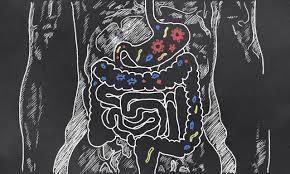
When it comes to maintaining a healthy gut, the right foods can make all the difference. You might have heard the term "superfoods" tossed around, but what exactly makes them so special? For your gut health, superfoods are packed with nutrients that support digestion, balance gut bacteria, and keep everything running smoothly. Let’s dive into some of the best superfoods for gut health and how you can incorporate them into your diet.
Why Gut Health Matters
Before we jump into the superfoods, it’s worth mentioning why gut health is so important. Your gut, or gastrointestinal tract, is home to trillions of bacteria that help with digestion, immune function, and even mental health. A balanced gut microbiome supports nutrient absorption, prevents harmful bacteria from taking over, and can even influence your mood.
My Gut Health Journey: A Superfood Revelation
I used to struggle with bloating and digestive discomfort, and it seemed like no matter what I tried, I couldn’t find relief. It wasn’t until I started focusing on incorporating gut-friendly superfoods into my diet that I noticed a real difference. These superfoods helped me feel more energetic, less bloated, and overall healthier.
Top Superfoods for Gut Health
1. Yogurt
Yogurt is often hailed as a gut health superstar thanks to its probiotics, the beneficial bacteria that can help balance your gut microbiome. Look for yogurt with live and active cultures, as these contain the good bacteria your gut needs.
My personal tip: I started adding a small bowl of yogurt to my breakfast routine, topped with fresh fruit and a sprinkle of nuts. Not only did it taste delicious, but it also made a noticeable difference in my digestion.
2. Kefir
Kefir is a fermented milk drink that's packed with probiotics. It’s similar to yogurt but has a tangier taste and a more liquid consistency. Kefir is known for its diverse strains of beneficial bacteria and yeast, which can be incredibly beneficial for gut health.
Personal experience: I found kefir to be a great alternative to yogurt when I wanted a change. Mixing it into smoothies or just enjoying it as a drink helped keep my gut flora balanced and my digestive system on track.
3. Sauerkraut
Sauerkraut is fermented cabbage and is a fantastic source of probiotics. It also contains vitamins C and K, along with fiber. The fermentation process enhances the probiotic content, making sauerkraut a great addition to any gut-friendly diet.
How I use it: I love adding sauerkraut to sandwiches or as a side dish with dinner. It’s a tangy, crunchy way to boost your probiotic intake and add some extra flavor to your meals.
4. Chia Seeds
Chia seeds are small but mighty when it comes to gut health. They are high in fiber, which supports digestion and helps maintain regular bowel movements. Plus, they are rich in omega-3 fatty acids, which have anti-inflammatory properties that can benefit the gut.
My favorite way to eat them: I make chia seed pudding by soaking them in almond milk overnight. It’s a tasty and filling breakfast or snack that’s also great for gut health.
5. Kimchi
Kimchi is a traditional Korean fermented vegetable dish, usually made with cabbage and radishes. It’s rich in probiotics and has a spicy kick that adds excitement to your meals. The fermentation process helps enhance its probiotic content, making it great for gut health.
What I do with it: I add kimchi to my rice bowls or use it as a topping for grilled meats. Its unique flavor and gut-friendly benefits make it a staple in my kitchen.
6. Garlic
Garlic is not only a flavor powerhouse but also a prebiotic food, which means it helps feed the beneficial bacteria in your gut. It has antimicrobial properties that can help keep harmful bacteria in check.
Personal anecdote: I’ve found that adding fresh garlic to my cooking not only improves flavor but also supports my gut health. Whether it’s in a savory sauce or a simple stir-fry, garlic is a must-have in my diet.
7. Bananas
Bananas are a great source of fiber and prebiotics, particularly when they’re slightly underripe. They help feed the good bacteria in your gut and can aid in digestion.
How I enjoy them: I often add bananas to my morning smoothie or enjoy them as a snack with a bit of almond butter. They’re not only gut-friendly but also incredibly versatile.
Tips for Incorporating Superfoods into Your Diet
Incorporating these superfoods into your diet can be both delicious and easy. Here are some tips to get you started:
- Mix and Match: Combine different superfoods to create balanced meals. For example, add yogurt and chia seeds to a smoothie, or top your salad with sauerkraut.
- Experiment: Don’t be afraid to try new recipes or ways to prepare these superfoods. Variety keeps things interesting and ensures you’re getting a range of nutrients.
- Listen to Your Body: Pay attention to how your body responds to different foods. Everyone’s gut is unique, so finding what works best for you might take some experimentation.
When to Seek Professional Advice for Gut Health
If you’re dealing with significant digestive issues or have specific dietary concerns, consulting a healthcare professional or a registered dietitian can provide personalized guidance. They can help tailor a plan that suits your individual needs and address any underlying health conditions.
Superfoods are more than just a buzzword—they’re an essential part of maintaining a healthy gut. By incorporating foods like yogurt, kefir, sauerkraut, chia seeds, kimchi, garlic, and bananas into your diet, you can support your digestive health and feel your best. With a bit of creativity and a focus on gut-friendly choices, you’ll be well on your way to a happier, healthier gut.
So go ahead, enjoy these superfoods, and give your gut the love and support it deserves!
Dr. Jace Sandell
Contact Me



